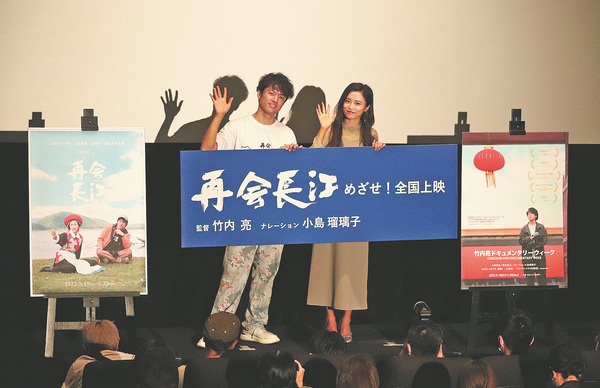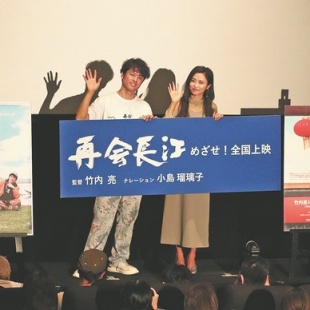Japanese director's China films debut in Tokyo


TOKYO — A film event dedicated to screening a series of China-themed documentaries shot by Japanese director Ryo Takeuchi is currently underway in Tokyo. At the recent premiere of his documentary The Yangtze River, Takeuchi expressed his intention to hold the documentary week in Japan.
"There are still many biased reports about China in Japan. So I hope that through these films, everyone can see an ordinary and real China that the media does not usually report, or that has not been reported," the documentary director said on May 19.
In fact, Takeuchi's story about the Yangtze River started much earlier. Back in 2011, he participated in the filming of a documentary about China's longest river for NHK, Japan's public broadcaster, when he sailed along the river from west China's Qinghai and Sichuan provinces down to Shanghai.
For the new production of the Yangtze River, Takeuchi traveled along the 6,300-kilometer river to record how the glacier melts and forms the "first drops of water" of the river, and shows the audience the changes that have taken place in China in the past decade on one river.
The 129-minute documentary not only showcases the magnificent scenery of China's mountains and rivers, but also takes a candid look at the great changes in China over the years through interviews and a decadelong comparison, providing insights into the real China by recording people's daily lives in a straightforward way.
Shiroiwa, a Japanese film fan, expressed his eagerness to visit China again: "I was fascinated by China when I first visited the country in 2018. I am really happy to see so many places in China through the documentary. Now that I have started learning Chinese, I hope to go to China again soon to see the Yangtze River."
More audience members said that their understanding of China has changed after watching the documentary.
Yamashita, who works in the Japanese financial industry, says, "Regarding the Three Gorges Dam, the Japanese media only reported that people were forcibly relocated. But through the documentary, I saw people living a different life through relocation and keeping up with the times.
"That really touched me. I hope more Japanese people can go to the cinema to see the film and understand China in a comprehensive way," he says.
The documentary gives the audience a real sense of the changes that China's development has brought to the lives of the people. Many Japanese viewers say that what impressed them the most in the movie was the changes in the life of Rinchen Cimu, a Tibetan girl.
"The Tibetan girl who could only greet tourists shyly with a lamb in her arms at the doorstep of her house and had never seen a high-rise building, became a high-end guesthouse operator 10 years later. It's really astonishing," Japanese reporter Ito says with emotion.
Takako Tajima from the Japan-China Friendship Association in Kanagawa prefecture says, "Through the documentary, I have seen a broader and richer China and the simplicity and kindness of the Chinese people. I was very moved.
"I want to invite the more than 500 members of the association to watch it, and I also hope that this documentary will be shown not only in Tokyo, but throughout Japan," she adds.
Running from May 19-25, Ryo Takeuchi's Documentary Week features four film versions of the documentaries The Yangtze River, 100 Faces of Huawei, Long Time No See, Wuhan, and Beyond the Mountain.
"I hope that everyone will understand the current China from multiple angles," Takeuchi says in the documentary's promotional materials. "I have shot films in dozens of countries, but I really haven't seen any country as interesting and incredible as China."
Xinhua





































